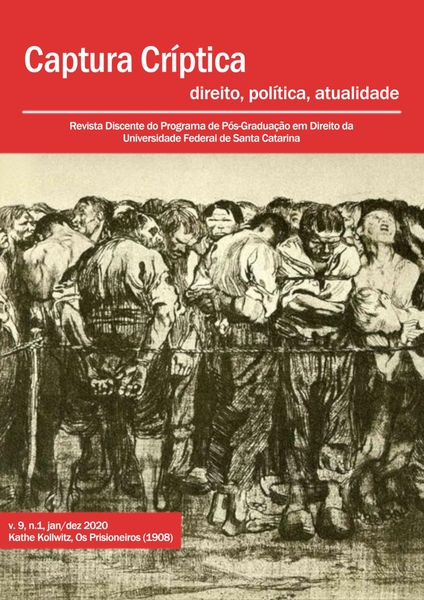Breve reflexão sobre o papel da forma-direito e da forma-estado na construção do fascismo clássico italiano
Palavras-chave:
forma-jurídica, forma-política, fascismoResumo
O presente trabalho visa analisar a relação entre as categorias marxianas e pachukanianas de forma-mercadoria, forma-jurídica e forma-política com o processo social fascista na Itália do início do século XX. A partir dessa análise, busca-se compreender como o direito se relaciona com o modo de produção capitalista, qual o papel do Estado na relação com as classes e com o direito, os efeitos sociais da crise capitalista na passagem de sua fase concorrencial para sua fase monopolista, bem como as causas do fascismo e sua relação com o capitalismo e com as lutas e disputas no campo das classes e dos fatores econômicos, políticos e jurídicos. O fascismo é um processo da sociedade burguesa, contraditório, que nega a democracia burguesa em discurso e garante, com prática organizada de milícias, a perpetuação do modo de produção capitalista, aprofundando suas relações de exploração e garantindo uma contra revolução e a desorganização dos movimentos operários. A forma jurídica garante o avanço do fascismo por meio da garantia da subjetividade jurídica mesmo em um momento de supressão de liberdades individuais, a propriedade privada é preservada e protegida legalmente.
Referências
CASTELO, Rodrigo. O Debate sobre as Crises Capitalistas nos Cadernos do Cárcere de Antonio Gramsci. UFF, NIEP MARX, 2011, Niterói, RJ.
CHASIN, J. Marx: estatuto ontológico e resolução metodológica. São Paulo: Boitempo, 2009
GRAMSCI, Antonio (2002). Cadernos do Cárcere, vol. 3. 2ª edição. Rio de Janeiro: Civilização Brasileira.
JÚNIOR, Arno Dal Ri. A criminalização política na itália fascista. Disponível em: https://iuscommune.paginas.ufsc.br/files/2020/07/Arno-Dal-Ri-Jr.pdf. Acesso em: 25 de mar. 2021
LOSURDO, Domenico. Para uma crítica da categoria de totalitarismo. 2002, tradução de Maryse Farhi, notas de editoria de João Quartim de Moraes, Crítica marxista.
MARTUSCELLI, Danilo Enrico. Alcances e limites do conceito poulantziano de fração reinante. Disponível em: https://anais9coloquiomarxengels.files.wordpress.com/2018/07/alcances-e-limites-do-conceito-poulantziano-de-frac3a7c3a3o-reinantes-danilo-enrico-martuscelli-uffs.pdf. Acesso em: 25 de mar. 2021
MARX, Karl. O Capital: Crítica da Economia Política, volume 1: o processo de produção do capital. 2011. Boitempo editorial, SP
MARX, Karl. Crítica da filosofia do direito de Hegel. 2019. Boitempo editorial, SP
MASCARO, Alysson Leandro. Crise e Golpe. 2018. Boitempo editorial, SP
MASCARO, Alysson Leandro. Estado e forma política. 2013. Boitempo editorial, SP
NETTO, José Paulo. Introdução ao estudo do método de Marx. São Paulo: Expressão Popular, 2011
PACHUKANIS, Evgeni.B. Fascismo. 2020. SP. Boitempo editorial
PACHUKANIS, Evgeni.B. Teoria geral do direito e o marxismo. 1989. Rio de Janeiro, Renovar.
ROIO, Marcos Del. Gramsci e Togliatti diante do fascismo. UNESP, FFC, 2020, SP.
SILVA, Christiane Pimentel. O método em Marx: a determinação ontológica da realidade social. Universidade Federal do Pará, Programa de Pós-Graduação em Serviço Social, Instituto de Ciências Sociais Aplicadas, Belém/PA, Brasil. 2018. Disponível em: http://dx.doi.org/10.1590/0101-6628.164. Acesso em: 25 de mar. 2021
Downloads
Publicado
Edição
Seção
Licença
Copyright (c) 2021 Gabriel Maia de Oliveira

Este trabalho está licenciado sob uma licença Creative Commons Attribution-NonCommercial-NoDerivatives 4.0 International License.
Os trabalhos publicados na Revista Captura Críptica estão sob a Licença Creative Commons Attribution-NonCommercial-NoDerivatives 4.0 International.










